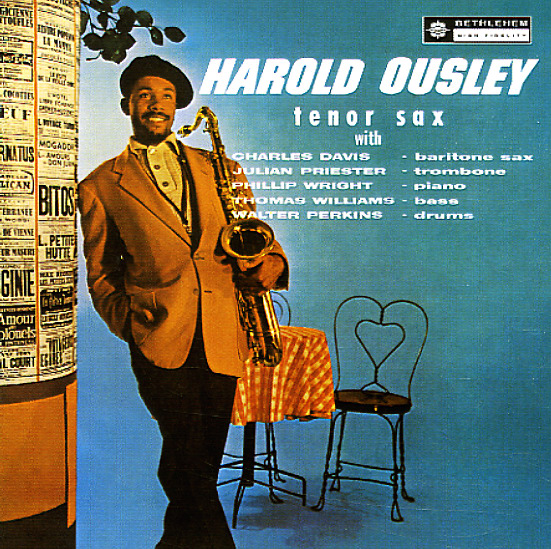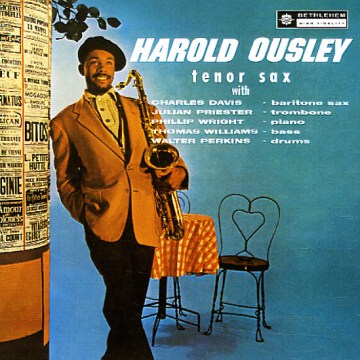Tenor saxophonist Harold Ousley combined relaxed, flowing, bluesy lines with a rich, resonant sound. Tenor Sax is his only album as a leader in the sixties.
Personnel
Harold Ousley (tenor sax), Charles Davis (baritone sax), Julian Priester (trombone), Philip Wright (piano), Thomas Williams (bass), Walter Perkins (drums)
Recorded
in 1960 in NYC
Released
as Bethlehem 6059 in 1960
Track listing
Side A:
Paris Sunday
Devachan
At Last
Lush Life
Side B:
Struttin’ To Truckin’
Dell-A-Vonn
Porter’s Groove
Ousley died of unknown causes last year, on August 13, 2015. Born in Chicago, Ousley turned professional in the late fourties, working in circus bands. In the fifties and sixties, Ousley played with Gene Ammons, Billy Holiday, Howard McGhee, Bud Powell, Miles Davis, Dinah Washington and organist Jack McDuff. With the reign of fusion and rock in the early seventies, work for tenor saxophonists like Ousley had become quite scarce. Ousley nevertheless held chairs in the big bands of Count Basie, Duke Ellington and Lionel Hampton, while recording a few albums as a leader of jazzfunk ensembles. Ousley continued working in r&b and blues for the rest of his career, playing with Big Maybelle, Ruth Brown, Percy Mayfield, George Benson, Jimmy Witherspoon and organist Bill Doggett.
Ousley also teached jazz programs in schools and developed a method of ‘music as therapy’. Alledgedly, Ousley appeared in the (depending on your taste, silly or wryly funny) blaxploitation movie Cotton Comes To Harlem in 1970. But Ousley is difficult to detect. Not to say, impossible. He isn’t credited. I’m beginning to suspect that the journalists who reported Ousley’s supporting role in their eulogies of Ousley last summer have been putting on the Flophouse Floor Manager. (So if you’ve watched the movie and have found the appearance of Ousley, please report and bust this utterly important jazz myth…)
More work in showbiz followed, as Ousley hosted a cable tv show in the early nineties, Harold Ousley Presents, joining the ranks of fellow musicians Johnny Cash, Tom Jones and Ernest Tubb, who all hosted shows at one time or another in their careers.
I’m really fond of Ousley’s marshmellow sound. He’s a gentle player with sly humour, who stays in the middle register for most of the time and favors a slightly dragging beat. Ousley is comfortable with rapid, multi-note lines as well. Of his scarce work as a recording sideman, his appearance on drummer Grassella Oliphant’s The Grass Roots (Atlantic 1965) is easily his best, a successful symbiosis of sound and style. He also contributed five tunes for that album, among them Haitian Lady and One For The Masses, which Ousley would re-visit later on; the contagious, bossa-fied hard bop tune Haitian Lady would appear on Brother Jack McDuff’s Walk On By (Prestige 1966). (Ousley contributed three tunes to that album and played on a number of McDuff sessions for Prestige, probably as a sub for Red Holloway) One For The Masses returned on both Ousley’s jazzfunk albums from 1972, The Kid and Sweet Double Hipness.
Ousley’s elegant, lush playing style is already present on Tenor Sax. His tenor mixes nicely with the other two reed instruments, resulting in a warm, full-bodied group sound. The rhythm section keeps a good groove. But they are playing it pretty safe, accenting the basic formula of theme-solo’s-theme as if they’re fresh out of music college, careful not to step on anyone’s toes.
Priester, one of the most promising trombonists at that time in his career, is swift and imposing. Charles Davis speaks huskily, eloquently. Surprise lurks around the corners of Ousley’s lines, and he embellishes the mid-and uptempo tunes with patiently executed, bluesy phrases. Those attractive mid-and uptempo tunes, like Paris Sunday, are set opposite a most satisfactory, intimate, breathy version of the classic ballad Lush Life.
Nice tenor work. It’s quite incomprehensible that it took the tenor saxophonist twelve years to follow up Tenor Sax with another album under his own name.

